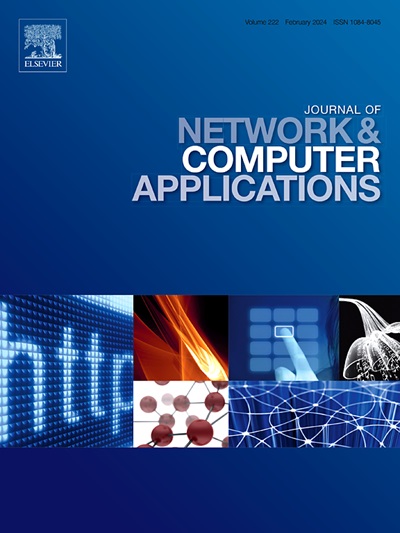A realistic trust model evaluation platform for the Social Internet of Things (REACT-SIoT)
IF 8
2区 计算机科学
Q1 COMPUTER SCIENCE, HARDWARE & ARCHITECTURE
引用次数: 0
Abstract
The Social Internet of Things (SIoT) enables cross-organisational collaboration for various industrial applications. However, evaluating trust models within such environments remains challenging due to context-dependent dynamics in SIoT environments. Existing evaluation platforms often rely on overly domain-specific or generic datasets, overlooking the inherent uncertainty and dynamicity of real-world SIoT settings. Additionally, there is a lack of practical platforms to assess the feasibility and effectiveness of trust models across diverse scenarios. In this study, we present the Realistic Trust Model Evaluation Platform for the Social Internet of Things (REACT-SIoT) to rigorously assess trust models in SIoT environments, thereby facilitating trustworthy collaboration for sustainable IoT transformations. REACT-SIoT addresses 21 identified requirements essential for simulating a realistic SIoT environment, including categories of heterogeneity, dynamicity, incompleteness, uncertainty, interdependency, and authentic real-world dynamics. We developed a configurable evaluation procedure that mitigates dataset bias and supports the assessment of both existing and newly developed trust models under various scenario-dependent settings. A real-world example demonstrates the platform’s capability to satisfy these requirements effectively. Our analysis reveals that REACT-SIoT meets all defined requirements and outperforms existing evaluation environments based on accuracy, trust convergence, and robustness criteria. The platform has been successfully applied to existing trust models, showcasing its applicability and enabling comparative assessments that were previously constrained by disparate evaluation settings and datasets. In conclusion, REACT-SIoT offers a highly- adaptable evaluation framework that ensures unbiased and comprehensive trust model assessments in SIoT environments. This platform bridges a critical gap in trust evaluation research, enabling the comparison and validation of trust models across diverse, realistic scenarios, thereby supporting the development of more resilient and trustworthy collaborative SIoT systems.
面向社会物联网的现实信任模型评估平台
社会物联网(SIoT)使各种工业应用的跨组织协作成为可能。然而,由于SIoT环境中与上下文相关的动态,在此类环境中评估信任模型仍然具有挑战性。现有的评估平台通常过于依赖于特定领域或通用数据集,忽视了现实世界SIoT设置的固有不确定性和动态性。此外,缺乏实用的平台来评估不同场景下信任模型的可行性和有效性。在本研究中,我们提出了社会物联网现实信任模型评估平台(REACT-SIoT),以严格评估SIoT环境中的信任模型,从而促进可持续物联网转型的可信协作。REACT-SIoT解决了模拟现实SIoT环境的21个基本需求,包括异质性、动态性、不完整性、不确定性、相互依赖性和真实世界动态的类别。我们开发了一个可配置的评估程序,以减轻数据集偏差,并支持在各种场景依赖设置下对现有和新开发的信任模型进行评估。一个真实的例子展示了该平台有效满足这些需求的能力。我们的分析表明,REACT-SIoT满足所有定义的需求,并且在准确性、信任收敛性和鲁棒性标准的基础上优于现有的评估环境。该平台已成功应用于现有的信任模型,展示了其适用性,并实现了以前受不同评估设置和数据集限制的比较评估。总之,REACT-SIoT提供了一个高度适应性的评估框架,确保在SIoT环境中进行公正和全面的信任模型评估。该平台弥补了信任评估研究中的关键空白,能够在不同的现实场景中对信任模型进行比较和验证,从而支持开发更具弹性和可信赖的协作SIoT系统。
本文章由计算机程序翻译,如有差异,请以英文原文为准。
求助全文
约1分钟内获得全文
求助全文
来源期刊

Journal of Network and Computer Applications
工程技术-计算机:跨学科应用
CiteScore
21.50
自引率
3.40%
发文量
142
审稿时长
37 days
期刊介绍:
The Journal of Network and Computer Applications welcomes research contributions, surveys, and notes in all areas relating to computer networks and applications thereof. Sample topics include new design techniques, interesting or novel applications, components or standards; computer networks with tools such as WWW; emerging standards for internet protocols; Wireless networks; Mobile Computing; emerging computing models such as cloud computing, grid computing; applications of networked systems for remote collaboration and telemedicine, etc. The journal is abstracted and indexed in Scopus, Engineering Index, Web of Science, Science Citation Index Expanded and INSPEC.
 求助内容:
求助内容: 应助结果提醒方式:
应助结果提醒方式:


